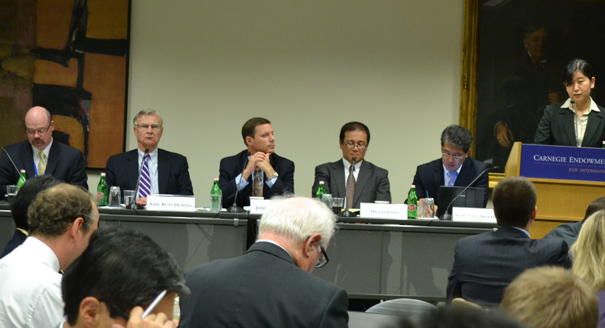Registration
You will receive an email confirming your registration.
IMGXYZ3950IMGZYXIn July 2011, the Sasakawa Peace Foundation launched a project assessing the Japanese-U.S. response to the Fukushima nuclear crisis. At an event hosted by Carnegie, two leaders of the project, Nobumasa Akiyama and Heigo Sato, presented their findings. They were joined by three U.S. government officials who worked on the front lines of the joint response—Ambassador Rust Deming, then director of Japan affairs at the State Department, Richard Love, then at the Office of the Undersecretary of Defense for Policy, and Carnegie’s James L. Schoff, who also worked at the Defense Department and who moderated the event.
Challenges Facing Japanese-U.S. Cooperation
- General Overview: Overall, Japanese-U.S. cooperation after the Fukushima crisis was a successful test case, Sato said. But the Allies can learn certain lessons that will enhance future cooperation.
- Ineffective Communication: Japan was not capable enough to gather, analyze, and disseminate information to the U.S. side in a timely manner, said Sato. Love added that the U.S. government also lacked proper assessment and validation of information. On top of that, redundancy in channels of communication caused confusion between the two governments, Akiyama and Deming stated.
- Differences in Crisis Management Styles: Japanese authority used a more “demand pull” approach, adding contingency plans as events unfold, while the U.S. government’s approach was more “supply push,” generating a large-scale response, then gradually scaling down to optimal level of reactions, added Sato.
Effectiveness of Japanese-U.S. Cooperation
- Humanitarian Relief: The U.S. team moved very quickly on the ground, with an experienced USAID working in support of Japan, asserted Deming.
- Nuclear Complications: The nuclear dimension of the crisis, however, initially stymied responders, because there was no established system for information exchange and decision making among nuclear specialists, disaster relief professionals, and traditional Alliance managers (including the military).
- Improvement in Communication: Ten days after the crisis ensued, Tokyo and Washington crafted the so-called Hosono process that consolidated different channels of communication into one between the Japanese government and the U.S. embassy in Tokyo, said Akiyama and Deming. This helped them deal with difficult decisions regarding response prioritization, resource allocation, liability concerns, and strategic communications.
Outlook for Response to Future Nuclear Crises
- Sato: As more power plants are built throughout the Asia-Pacific, the Japanese-U.S. model may provide lessons to future regional initiatives in responding to nuclear accidents.
- Akiyama: Japanese-U.S. assistance for a third country is possible, but at the same time, it is essential that the recipient country enhance its own capacity to respond to nuclear crises. It is also important for countries to comply with rules and norms of the international regime and improve information transparency to ensure the safety of nuclear operations.
- Deming: The United States and Japan need to maintain commitment in the global nuclear community by setting a standard for nonproliferation and nuclear safety.
- Love: The U.S. government needs to improve its reaction to crises with more effective communication in a timely manner. Future reform in terms of governmental structure and personnel is also critical.
This event was cosponsored by the Sasakawa Peace Foundation.
